Why do hens lay unfertilised eggs?
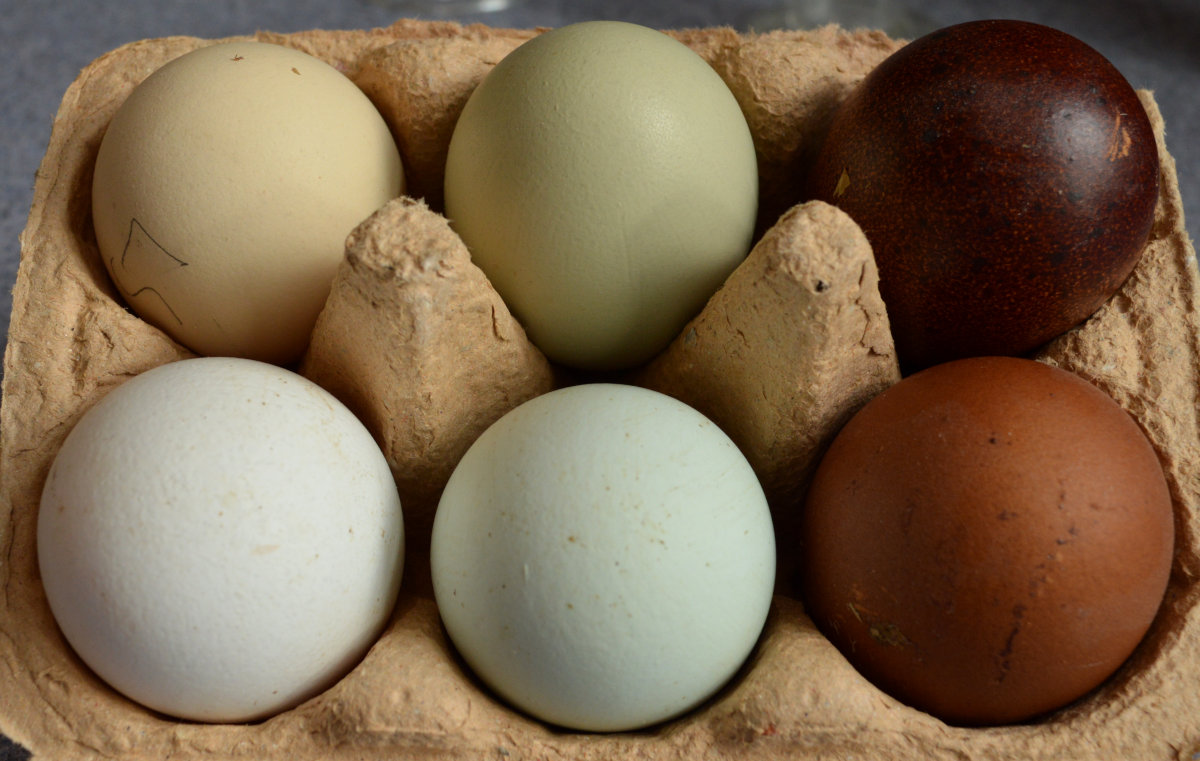
Chickens produce eggs whether they are fertilised or not.
Hens lay unfertilised eggs because they are oviparous, which means that they lay eggs whether or not they have been fertilised by a male. This is in contrast to mammals, which are viviparous, meaning that they give birth to live young.
Hens instinctively produce a clutch of eggs in a nest and then go broody in an attempt to hatch chicks. Hens will continue to lay eggs even if she has not been fertilised by a rooster in just the same way she would if the rooster was sterile.
The biological systems will continue to operate even if there is no fertilisation. This is true of a lot of species that have a fertility cycle.
Once the egg is laid, it is not fertilised by a rooster, the egg will not hatch into a chick although the egg can still be eaten, as it is perfectly safe and nutritious.
Chickens have been domesticated and bred to lay more and more eggs, specifically for human consumption. Those that didn't lay excessively were culled, and the top layers were bred to produce even more superstar layers.
Below: The classic bullseye on the yolk of a fertilised egg.
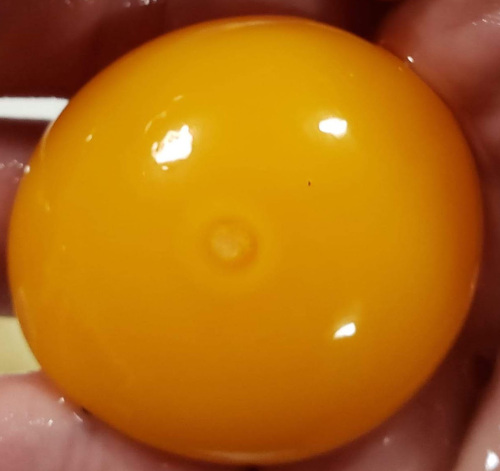
Whilst it is important to disassociate the mammalian menstruation from a bird laying an egg they are similar in some respects in that they happen on a regular cycle even if the eggs are not fertilised. This is approximately 28 days in humans and 24 - 26 hours in chickens.
The reasons hens lay unfertilised eggs:
Here's why hens lay unfertilised eggs:
Internal egg development: Hens have a reproductive system that allows them to produce eggs independently of fertilisation. Inside a hen's body, a yolk is released from the ovary and then travels through the reproductive tract, where it develops into an egg. This process occurs regularly, typically once every 24-26 hours.
Lack of mating: Hens can lay eggs without mating because their reproductive system functions independently. If a hen hasn't mated with a rooster, the eggs she lays will be unfertilised. Without fertilisation, the eggs do not develop into embryos.
Hormonal regulation: The release of eggs from the ovary is regulated by hormones, specifically oestrogen. These hormones are produced by the hen's body in a cyclical pattern, regardless of whether mating has occurred or not. As a result, hens will continue to lay eggs in regular intervals, whether they have access to a rooster or not.
Domestication: Domesticated hens have been selectively bred over generations for egg production, which has further enhanced their ability to lay eggs without mating. This trait has been favoured by poultry farmers who primarily focus on egg production rather than breeding for offspring.
Finally, there is some speculation that hens may lay unfertilised eggs in order to attract a rooster. This comes from the fact that hens often come into lay before the roosters start treading them and the first few eggs are infertile.
Below: Hens will produce a nest full of egg whether they are fertilised or not.
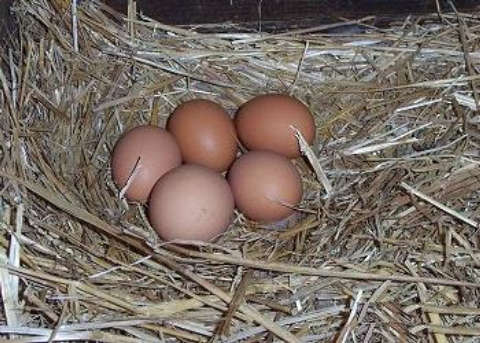
The chicken cannot know in advance whether the egg she makes will end up fertilised or not, so it just has to go ahead and grow the egg in the hopes that it will be fertilised. In the wild, this system works well because there are often a few males around and mating among fowls is common and most eggs do end up fertilised.
Wild chickens will stop laying when the nest is full and then begin sitting on the eggs, probably only laying 12 to 16 eggs.
You can see this effect in action, Guinea fowl in the wild may only lay 60 to 90 eggs a year in 3 clutches but my domestic ones produce as many as 140. I have a heritage Turkey whose best yearly total was 62 eggs but commercially they may lay for 6 months or more.
Are the egg we eat fertilised?
Most of the eggs that you buy in the supermarket are unfertilised eggs. This is because roosters are not necessary for egg production.
As long as a hen has a healthy diet and enough light, she will continue to lay eggs, even if there is no rooster present. Whether or not an egg is fertilised does not affect its nutritional value or appearance.
They taste just the same regardless. From an eating point of view there is no difference between a fertilised and unfertilised egg.
If you buy your eggs in a store then the chances are they have not been fertilised. There is no way to tell unless you look at the tiny white spot on the yolk that is the female reproductive cell. This is a bit of a skill and takes some practice.
Below: An unfertilised shop bought egg.
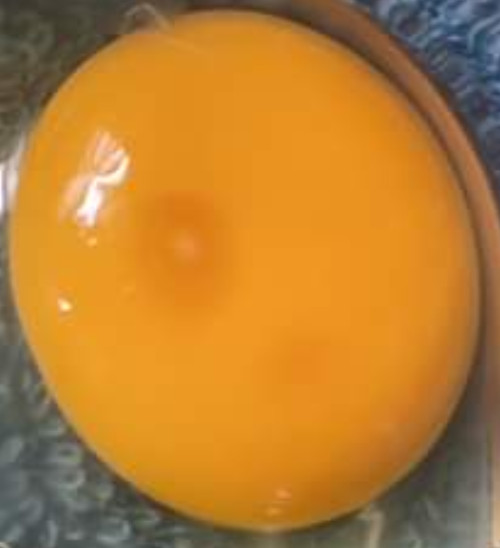
That being said I have successfully incubated shop bought eggs so this is not always the case.
The chicken does not know if her eggs are fertilised or not. She simply passes an egg when an egg is ready. It’s not just chickens that lay unfertilised eggs, any female bird will lay unfertilised eggs, just far fewer. Chickens have been intensively bred over many, many generations to lay as many eggs as possible.
No wild bird consciously lays fertilised eggs. Normally there are breeding periods restricted to weather and/or food availability. In those ‘breeding periods’ the gonads and ovaries grow incredibly rapid to an functional size. Outside that time their reproductive organs shrink again.
Below: The stages of development in yolks in a chicken.
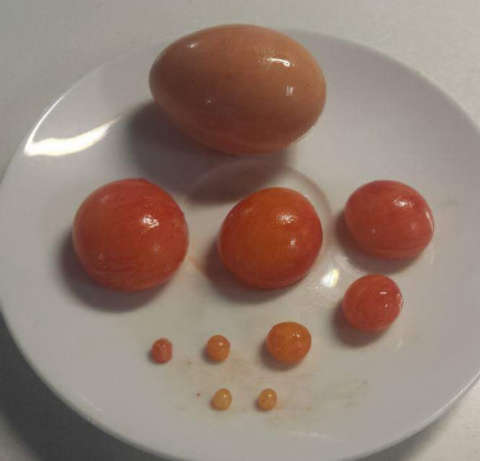
The wild ancestors of our chickens did not lay eggs all the time, only in the suitable season, where the hen would build a rough nest and solicit copulation for a male (rooster), Lay her 12 or so eggs and incubate.
Man has selectively bred these fowls over many years and kept the ones hat laid more and more eggs, this can be achieved with even wild birds by removing any other than the first 2 eggs laid, she will often continue laying and is indeed a valuable tool to save some species from extinction.
Can a hen lay eggs without a rooster?
Domestic chickens are very different from the original wild Red Jungle Fowl which they were bred from. Over thousands of years, humans bred them to keep laying eggs throughout the year rather than just during the breeding season.
Any female bird will lay a egg when it is ready, if the male is infertile it will never hatch. The egg does not need to be fertilised to be produced, the two processes are completely separate.
The hens don't know what happens to their eggs, they're just programmed by nature to keep filling the nest.
Below: The eggs producing organs of a chicken.
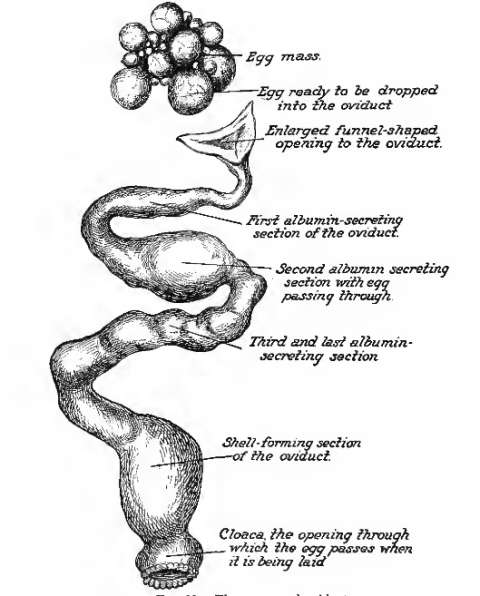
I can always remember from my youth it was the surplus roosters and hens that didn't lay so many eggs that found their way to the pot or roasting tray. It makes sense that over the years hens have laid more and more eggs as we have chosen those birds to stay in our flocks.
Most bird species in the wild, as far as I know, wait until mating season. The reason here is that in the spring there is more food and warmer weather so it makes sense to raise your family at this time.
The male and female mate, the female lays a number of eggs in the nest, between one and 30 depending on the type and incubation begins. Once a brood has been raised successfully they either start over and raise a second or the wait begins until the following year. The quantity of eggs laid doesn't depend on their size, ostriches often raise a family of 20 or 25 and penguins only 1.
The whole point with this is that birds don't need to understand that fertilisation is necessary for survival. They just mate and produce eggs. Their bodies don't need to be able to determine if sperm is present and, if there isn't, shut off the processes that create eggs.
Hens will happily lay eggs on their own without a rooster in the flock, It is often preferable as cockerels have a lot of testosterone and can be a handful as well as being noisy.
Chickens lay the same number of eggs whether or not the male is about Having a rooster in the flock won't effect egg production at all.
Why do hens lay every day if other birds are seasonal?
Chickens are no longer wild birds created by natural selection, but domestic animals created by artificial selection.
Chickens still do not naturally lay every day all year round - they are still seasonal to some extent. Even the commercial breeds that have been created to have maximum egg yield, must be kept under lights to simulate long summer daylight hours and keep them laying all year long.
If you have chickens at home or on a small farm, then you know that they naturally stop laying for a few months as the days get shorter and they get less daylight.
I have even stopped chickens laying by keeping them in a slightly darkened room for a few days (to give them time to recover when they were in danger of becoming egg bound, or laying soft shelled eggs that can crack inside them and cause infections).
I have some breeds that are very seasonal layers, mostly meat birds. My La Bresse Gauloise only lay from March to October and almost never lay an egg out of that season but then they have been selected to be meat birds and not dual purpose or egg layers.
One of the other key mutations was a change to a gene that linked birds’ laying of eggs to the length of the day.
Most birds only mate and lay eggs when the short winter days give way to longer days in the spring/summer, since this is when food sources and temperature give optimal conditions for raising chicks.
Domestic chickens mate, lay eggs and raise chicks all year round, because of this mutation decoupling their egg laying with day length. Domestic chickens also lay, regardless of the availability of males to fertilise them, on a 25 hour cycle.
Do chickens sit on unfertilised eggs?
Chickens can and will sit on unfertilised eggs. This is because they have a natural instinct to hatch eggs, whether or not they are fertilised. If a hen is broody, she will sit on a clutch of eggs for about 21 days, even if they are not fertilised.
If a hen sits on unfertilised eggs, nothing will happen. The eggs will not hatch, and the hen will eventually give up and leave the eggs. However, if a hen is broody, she may continue to sit on the eggs for weeks or even months, even though they will never hatch.
There are a few things you can do to discourage a broody hen from sitting on unfertilised eggs. One is to remove the eggs from the nest. Another is to provide the hen with a distraction, such as a new toy or a change in her diet. If you are unable to discourage the hen from sitting on the eggs, you may need to remove her from the nest.
It is important to note that if you remove the eggs from a broody hen, she may become aggressive. You should take care when handling her and avoid making any sudden movements.
This is a common question from backyard poultry keepers who are frustrated by their ladies settling themselves down on a nest of eggs even though there is no rooster in the flock. She is just driven by her desire to reproduce and she knows that keeping a nest of eggs warm is the way to do it.
When they are first laid in the nest the hen has no idea at all if the are fertile. She will settle on them and begin to incubate the eggs. This is instinctive in chickens as it is with most birds. Hens can normally tell if the eggs aren't right after about 10 days to 2 weeks or so and she may leave the nest if she senses something is amiss.
I am always amazed at my hens ability to roll certain eggs out her nest. She instinctively seems to be able to spot the rotten or infertile ones and will roll them away.
